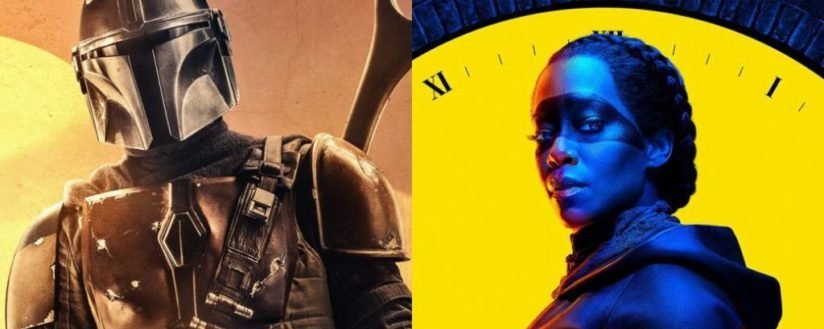Watchmen’s experimental surrealism and The Mandalorian’s Baby Yoda and cutting-edge LED-wall helped both shows scoop the awards pool at the Creative Emmys. Watchmen also took out some of the major prestige awards to earn the highest number of Emmys this year.
The Mandalorian and Watchmen picked up the most awards at the Creative Arts Emmys; each winning 7 awards apiece. Then tonight, Watchmen took the lead adding some prestigious awards to their tally at the main event: the 72nd Primetime Emmys Awards. Watchmen dominated the Emmys, earning 11 statuettes out of an impressive 26 nominations.
The impressive awards haul made by both shows are well-deserved. Watchmen and The Mandalorian are both innovative and unafraid of challenging the sci-fi and superhero conventions that underpin their stories. Damon Lindelof bravely reconfigured Alan Moore’s original graphic novel into a commentary on racism, representation, and police brutality in America, which, with its masked vigilantes seeking justice, has become painfully prescient.
Consequently, Watchmen won the award for Outstanding Limited Series. Lindelof, and seven other executive producers, nabbed an Emmy in this category. Special mention should go to executive producer Nicole Kassell, who directed a number of the show’s episodes including the pilot. A surprising omission at the Emmys is Stephen Williams, who directed episode six, “This Extraordinary Being”, which won more Emmys than any other episode of television this year.
The Mandalorian, on the other hand, took Star Wars into the brave new frontier of outlaws and bounty hunters and introduced the film industry to a new innovative approach to cinematography and visual effects. Jon Favreau returned to the roots of the original Star Wars, specifically in the successful blending of tropes from Akira Kurosawa’s The Seven Samurai and the spaghetti western; both of which influenced George Lucas. The ever-innovative Industrial Light & Magic changed the effects game with StageCraft, which replaced green screens with its LED-wall.
The StageCraft volume set at Manhattan Beach Studios has revolutionized visual effects, allowing real-time onset shooting with the addition of Epic’s Unreal Engine. The Mandalorian environments were projected onto the LED backdrop, with actors performing in front. This kept green screen work to a minimum and eliminated costly and time-consuming location shoots. The future of big-budget filmmaking will become considerably more efficient and cost-effective in the future. Nonetheless, the biggest innovation of this wall tech is the accurate camera tracking and perspective-effect 3D imagery, which made audiences believe the actors were filmed on location.
StageCraft proved so successful that ILM has built a second permanent stage in Manhattan Beach, along with a third in Pinewood Studios in London, and a fourth in Fox Studios Australia. With the four corners of the film-making world covered, in the foremost movie studios globally, StageCraft is set to replace a lot of green screen work almost immediately. Thor: Love and Thunder will be one of the first feature films–or even the first–to utilize the tech. And Weta Digital and Pinewood Atlanta Studios have recently developed their own virtual production LED studios.
The popularity of Baby Yoda with audiences is bolstered by its cutting-edge mix of puppetry and CG animation. Legacy Effects is responsible for the effective hero puppet; the result of a fine legacy in puppetry and CG animation itself. Baby Yoda is an update on the puppetry created by Stuart Freeborn for Master Yoda in The Empire Strikes Back, and the CG effects that re-created Yoda for the original release of 1999’s The Phantom Menace. ILM’s updated effects allowed Baby Yoda to walk, crawl, spit at frogs, and use The Force.
As expected, the half-hour series grabbed the award for visual effects and took home awards in major categories for cinematography, production design, and original series score.
Here’s a list of the awards each show won:
Watchmen
Outstanding Limited Series
Outstanding Cinematography For A Limited Series Or Movie
(“This Extraordinary Being”)
Gregory Middleton, ASC, CSC, Director of Photography
Outstanding Sound Editing For A Limited Series, Movie Or Special
(“This Extraordinary Being”)
Outstanding Sound Mixing For A Limited Series Or Movie
(“This Extraordinary Being”)
Outstanding Writing For A Limited Series, Movie or Dramatic Special
(“This Extraordinary Being”)
Outstanding Single-Camera Picture Editing For A Limited Series or Movie
(“A God Walks Into Abar”)
Henk Van Eeghan, ACE, Editor
Outstanding Fantasy/Sci-Fi Costumes
(“It’s Summer And We’re Running Out Of Ice”)
Outstanding Music Composition For A Limited Series, Movie or Special
(“It’s Summer And We’re Running Out Of Ice”)
Outstanding Supporting Actor in A Limited Series Or Movie
Yahya Abdul-Mateen II, as Cal Abar / Dr. Manhattan
Outstanding Lead Actress In A Limited Series Or Movie
Regina King, as Angela Abar/Sister Night
Outstanding Casting For A Limited Series Or Movie
The Mandalorian
Outstanding Music Composition For A Series (Original Dramatic Score)
(“Chapter 8: Redemption”)
Outstanding Stunt Coordination For A Drama Series, Limited Series Or Movie
Ryan Watson, Stunt Coordinator
Outstanding Cinematography For A Single-camera Series (Half-hour)
(“Chapter 7: The Reckoning”)
Greig Fraser, ASC, ACS, Director of Photography Baz Idoine, Director of Photography
Outstanding Production Design For A Narrative Program (Half-hour)
(“Chapter 1: The Mandalorian”)
Andrew L. Jones, Production Designer Jeff Wisniewski, Art Director Amanda Serino, Set Decorator
Outstanding Sound Editing For A Comedy Or Drama Series (Half-hour) And Animation
(“Chapter 1: The Mandalorian”)
Outstanding Sound Mixing For A Comedy Or Drama Series (Half-hour) And Animation
(“Chapter 2: The Child”)
Outstanding Special Visual Effects
(“Chapter 2: The Child”)
